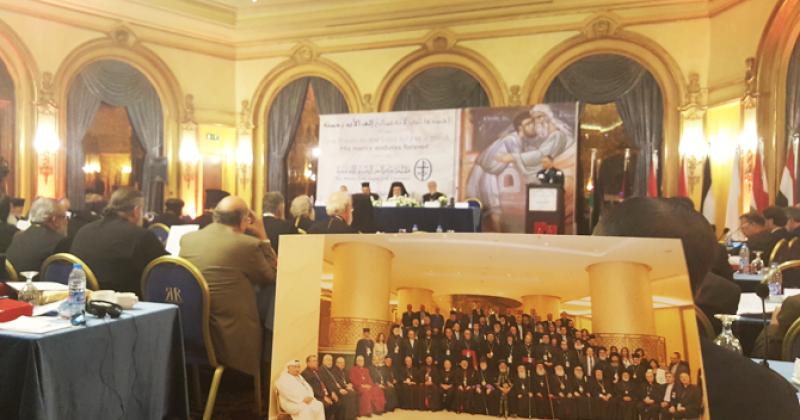The three-day meetings of the 11th General Assembly of the Middle East Council of Churches (MECC) have been a source of pride for every Jordanian due to the fact that dear Jordan hosts for the first time official delegations comprising all parties to the Middle East and all Churches. It, undoubtedly, indicates the state of security and stability that Jordan enjoys. We all pray that the status quo will always prevail.
As a reminder, the MECC general assembly convenes every four years. The MECC was founded in 1974. It represents the ecumenical image which is related to the unity of the Church in the Middle East. It is based in Beirut. It came into existence on the heels of the founding of further comprehensive council, namely the World Council of Churches, which was founded in 1948 and based in Geneva.
The meetings of the 11th General Assembly of the Middle East Council of Churches in Amman have been a unique and distinctive event. I would like to list five points:
First: In September 2013, His Majesty King Abdullah II Bin Al Hussein called for an international conference in Amman to discuss the challenges facing the Christian Arabs. In his speech, he said: "We also believe that the protection of the rights of Christians is a duty rather than a favour." In September 2106, His Majesty the King received anew heads of delegations, and reasserted that "Christians in the Arab world are an integral part of the Arab social fabric and protecting their rights is a duty of all."
The period between September 2013 and September 2016 witnessed several tragedies and the displacement of the Christian component. So, His Majesty the King has been the greatest supporter of Christians and of the sublime plurality in the Orient. Jordan has welcomed, under the directives of His Majesty the King, many displaced people particularly those from the Mosul area and its environs.
Second: The convening of the MECC general assembly was an optimum opportunity to host a number of heads of the Eastern Churches, who came to Jordan for the first time since assuming their current posts particularly Pope Tawadros II who arrived in Jordan where several members of his community have been working sincerely. Furthermore, these meeting follow the passing of Egypt's lawmakers of a law that spells out the rules for building churches. The Pope of Alexandria has always been an influential person in the hearts of millions of people. The delegation attending the conference also included Patriarch of the Syriac Orthodox Church Moran Mor Ignatius Aphrem II who arrived from Syria, the country which we pray for restoring love, peace and stability. Furthermore, among the participants in the meetings was Eastern Orthodox Patriarch of Alexandria and all Africa Theodore II. These outstanding personalities have a history, an identity, an important presence, institutions, pains and hopes. All of these characteristics have been placed in Amman in order to bring about further unfailing hopes.
Third, the conference hosted influential speakers in order to shed light on the "challenges" facing the Christians in the Orient. Amman Mayor Akel Biltaji, who is well-known for his balanced personality and his endeavours to preserve social peace and brotherly love, made an address. Nabila Makram, the only Christian Egyptian minister in charge of immigration and expatriate affairs who was full of enthusiasm, talked about the need to maintain "a dialogue of life for a society that respects diversity and equality, as well as that preserves freedoms and safeguards people's dignity and rights." Fr. Fadi Daou from Lebanon, a prominent figure in the field of inter-religious dialogue and the founder of Adyan Foundation, called for focusing on "the values of citizenship, respect for diversity, and cooperation on humanitarian and spiritual bases."
Fourth: It was clear that various media outlets were waiting for the final statement. What do the patriarchs, the heads of churches, and the members of the executive committee want to tell the faithful as well as the peoples of the region and the world? They said from Amman, in short and without involving politics or indicatives seeking solutions: "The General Assembly of the Middle East Council of Churches expresses solidarity with the peoples of the region. It pleads divine mercy for the victims of violence, solace for the pained, and courage for those seeking to achieve justice and peace. The very words of the Lord: "But take heart! I have overcome the world." (John 16:33) remain a source of confidence, hope and steadfastness. Let us adhere to our faith and our testimony to the Gospel of love and peace, and preserve the legacy of our fathers and grandfathers in our holy oriental land."
Fifth: As I have been reelected to the membership of the executive committee so as to represent the Latin Church in the Council, I have the honor to reiterate the content of the congratulatory statement addressed to our Muslim brethren marking Eid Al Adha, and say: "The General Assembly of the Middle East Council of Churches congratulates all Muslims on the occasion of Eid Al Adha. We plead the Almighty God that this will be a source of goodness, blessing, peace and security in our oriental region and the world." Happy Eid.
